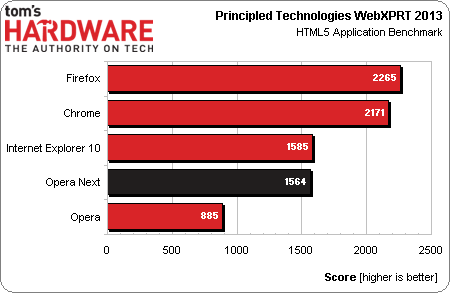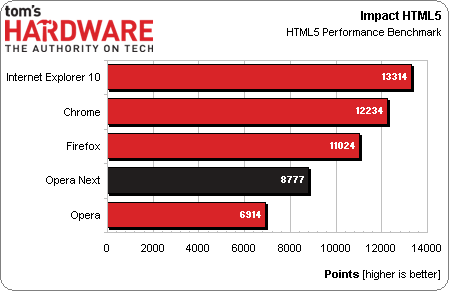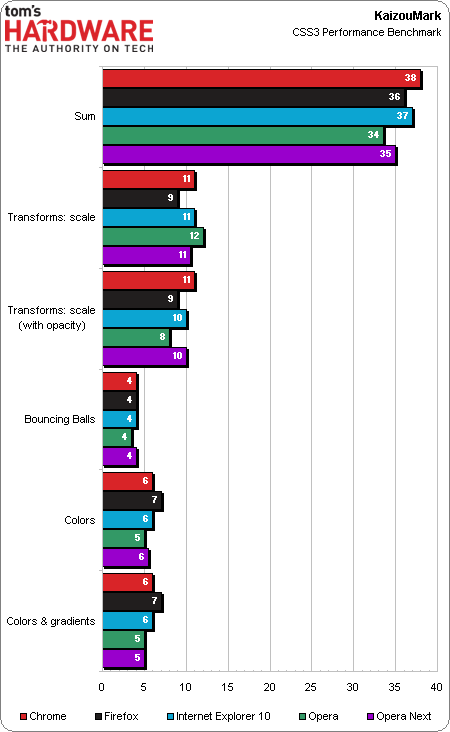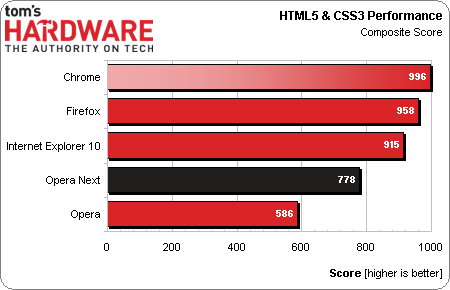Chrome 27, Firefox 22, IE10, And Opera Next, Benchmarked
Today, we have the latest benchmark results from the top four Windows-based Web browsers, along with a sneak peek at Opera's upcoming Chromium-based overhaul. Is this really a step-up from Presto/Carakan or just another Chrome clone?
HTML5 And CSS3 Performance
Why you can trust Tom's Hardware
HTML5
WebXPRT 2013 by Principled Technologies is now out of the consumer preview stage and officially live. This HTML5 benchmark is framed in the scenario of Web apps for productivity. Tests include photo effects and face detection to represent common tasks of an image editor, a stocks dashboard with tables and charts, and an offline notes app.
Add another win to the Firefox tally, though Chrome is so close that Mozilla nearly has a tie on its hands. IE10 and Opera Next are distant third- and fourth-place finishers (respectively), and Opera 12 is far behind the pack in last place. Once again, Opera Next appears to be taking the Norwegian browser in the right direction, posting nearly double the score of Opera 12.
This benchmark is a timedemo of the Impact HTML5 game, so it should be pretty indicative of casual, 2D HTML5-based titles.
IE10 pulls off an upset, achieving the highest score in Impact and beating Chrome by just 1100 points. Firefox places third, with the duo of Operas in tow. Next upstages the current version of Opera again, though not by nearly as much as in the productivity-oriented WebXPRT.
CSS3
Also returning to the WBGP is a CSS test. KaizouMark is a modern CSS3 benchmark that returns individual results for its five tests. The top set of bars is the sum of the five higher-is-better KaizouMark scores, while the remaining bars contain the individual test results.
Chrome takes the lead, with IE10 placing second. Firefox 22 winds up in third, Opera Next takes fourth, and Opera 12 isn't far behind in fifth.
HTML5/CSS3 Composite Score
Our HTML5/CSS3 composite score is made up of all three tests on this page.
Chrome 27 barely pulls ahead of second-place finisher Mozilla Firefox, with IE10 close behind in third. Trailing the pack is Opera Next in fourth place. Opera 12 falls to the bottom with a score of roughly half that of Chrome or Firefox.
Current page: HTML5 And CSS3 Performance
Prev Page JavaScript And DOM Performance Next Page Hardware Acceleration PerformanceGet Tom's Hardware's best news and in-depth reviews, straight to your inbox.
-
Onus No, the Onus is not on Google; I'm using www.startpage.com for my searches.Reply
While this is interesting, I still encounter built-in pages (such as on routers or other network devices) that will not render cleanly in Firefox, but are perfect in IE. More often than not though, pages that would be filled with nuisance ads and popups are cleaned up nicely by Firefox with AdBlock+ and NoScript.
-
soundping A good test is rendering a heavy site like Huffington Post. They use a ton of flash and java scripts.Reply -
ivyanev While benchmarks are the way to compare browsers, they do not represent the feel you get- firefox might be faster but still feels sluggish compared to chrome or opera(the stable one).Reply -
pharoahhalfdead I would like to see benchmarks on page start up, and load times comparing ssd, hard drives, and ram drives. Maybe I missed these an a previous article, but I feel since ssd's and ram drives are getting more popular, benchmarks should prove or dispel the the 'so called' benefits they bring.Reply
I have both and start up times for IE are quick but page load times are horrendously slow, whereas FF has slow start up times but superfast page load times. It's possible that add-ons are contributing to that. -
mccainm Ever since I have compared Firefox and Chrome I've always found Chrome to start much faster (I'm running the Dev channel and my wife uses the Stable channel and they both take maybe 1 - 2 seconds to start cold or hot). Only IE beats both of them. Maybe Firefox 22 is that much faster and worth a try, but seeing as Chrome did so well in most categories I'll probably stick with it.Reply -
EzioAs Having move back to Firefox a couple years ago after Chrome, I don't intend to use Chrome (or any other browser) regularly anymore. I still give Chrome 2-3 tries a week (just to compare things) but Chrome isn't better than FF in 3 things:Reply
1) Pages load noticeably slower
2) Memory usage is indeed high (as seen in the benchmark above)
3) FF add-ons are much better than chrome extensions.
I never noticed any startup time difference for both FF and Chrome; it's possible they're both fast enough that it doesn't even matter at this point. I also like the FF toolbars better although that's really more of a personal preference. I've never tried maxthon though; heard it's pretty good. -
beoza I've never really noticed a difference in browsers speed wise. Sure some load pages faster than others, and some have issues with certain pages. But in the end they all take me to the same place. I use Firefox 95% of the time at home with adblock+, if I encounter an issue I clear cache, if it still has issues I switch to IE 10, usually this is all I need to do but once in a while IE has problems with a page and I just move on to something else. At work I'm stuck using IE10. The speed of a browser can also be affected by other factors like the speed of your connection, how many devices are on your network, what tasks your doing on the computer at the same time like gaming, downloading, streaming movies (netflix, hulu), and your hardware. You're not going to get much responsiveness on a 5yr old celeron w/2gb ram and Win XP while you're downloading a game, watching youtube and the A/V suite scans your computer in the background, and there's 5 other people all sharing your 10Mbps network. Which describes probably 50% of the users out there in the real world.Reply -
Someone Somewhere Opera Next (and every other browser) is a significant step down in terms of features/customization from the current version.Reply
I'll miss a hell of a lot of stuff when I move off Presto-based Opera. -
ElDani Well done on this test, I actually found the test results genuinely helpful and your summary/conclusion to be well thought out.Reply
Still, this test shows us once more, that no modern browser - I exclude Opera from this, since it isn't a maintained release anymore - must absolutely be replaced by the winner of such tests. If you don't mind performance weaknesses of the Internet Explorer in certain areas, or if your most-accessed websites don't require you to use a certain alternative, then even Microsoft's browser of choice can be okay for daily use (if only as an engine in products like Avant, Maxthon, etc).
The one thing I'm a bit curious about: why does Opera Next suddenly behave so differently from Chrome? Yes, there's a difference between Chrome 27 (WebKit) and Opera Next (Blink = Chrome 28), but if that's the only reason for the browser's weaker showing, then the future of Chrome doesn't look too good. What's your take on this? -
tomfreak I dont know how useful in this review when they are tested all the browser on a 1155 super computer, nobody is going to tell the diff if the browser is 0.25sec faster. Get some Brazos, Atom and run the test, these are the platform have problems with web browsing.Reply



